| Listing 1 - 10 of 96 | << page >> |
Sort by
|
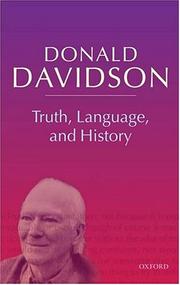
ISBN: 019823757X 0198237561 0191602612 1435633695 9786611190293 0191519243 1281190292 9780198237563 9780198237570 Year: 2005 Publisher: Oxford: Clarendon,
Abstract | Keywords | Export | Availability | Bookmark
 Loading...
Loading...Choose an application
- Reference Manager
- EndNote
- RefWorks (Direct export to RefWorks)
Truth, Language, and History is the much-anticipated final volume of Donald Davidson's philosophical writings. In the four groups of essays that comprise it, Davidson continues to explore the themes that occupied him for more than fifty years: the relations between language and the world; speaker intention and linguistic meaning; language and mind; mind and body; mind and world; mind and other minds. He asks: what is the role of the concept of truth in these explorations? And, can a scientific world view make room for human thought without reducing it to something material and mechanistic? Davidson's underlying picture, which can be seen in many of these essays, is that we are acquainted directly with the world, not indirectly via some intermediary such as sense-data, representations, or language itself; that thought emerges in the first place through interpersonal communication in a shared material world, and continues to develop as we engage each other in dialogue; and that language depends on communication, not vice versa. This is the triangulating situation - two creatures communicating about a common world - about which Davidson has written elsewhere. As for the mind-body relation: our ontology need posit nothing more that material objects and events; but as explainers we require two mutually irreducible vocabularies: mind and body. In the last six essays Davidson finds interconnections between his own views and those of some of the major philosophers of the past. Including a new introduction by his widow, Marcia Cavell, this volume completes Donald Davidson's colossal intellectual legacy.
Philosophy of language --- Theory of knowledge --- Philosophy, Modern --- Philosophy, American --- Philosophy [Modern ] --- 20th century --- Philosophy [American ] --- Erkenntnistheorie. --- Langage et langues --- Logik. --- Philosophy --- Philosophie américaine --- Philosophie --- Philosophy, American. --- Philosophy, Modern. --- Sprachphilosophie. --- Taal. --- Waarheid. --- Wahrheit. --- Philosophie. --- History & Surveys --- Modern. --- 1900-1999.
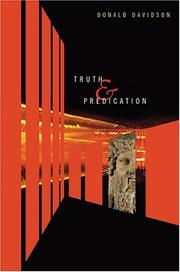
ISBN: 0674015258 9780674015258 0674030400 0674030222 9780674030220 9780674030404 Year: 2005 Publisher: Cambridge (Mass.): Belknap press of Harvard university press,
Abstract | Keywords | Export | Availability | Bookmark
 Loading...
Loading...Choose an application
- Reference Manager
- EndNote
- RefWorks (Direct export to RefWorks)
This brief book takes readers to the very heart of what it is that philosophy can do well. Completed shortly before Donald Davidson's death at 85, Truth and Predication brings full circle a journey moving from the insights of Plato and Aristotle to the problems of contemporary philosophy. In particular, Davidson, countering many of his contemporaries, argues that the concept of truth is not ambiguous, and that we need an effective theory of truth in order to live well. Davidson begins by harking back to an early interest in the classics, and an even earlier engagement with the workings of grammar, in the pleasures of diagramming sentences in grade school, he locates his first glimpse into the mechanics of how we conduct the most important activities in our life - such as declaring love, asking directions, issuing orders, and telling stories. Davidson connects these essential questions with the most basic and yet hard to understand mysteries of language use - how we connect noun to verb. This is a problem that Plato and Aristotle wrestled with, and Davidson draws on their thinking to show how an understanding of linguistic behavior is critical to the formulating of a workable concept of truth. Anchored in classical philosophy, Truth and Predication nonetheless makes telling use of the work of a great number of modern philosophers from Tarski and Dewey to Quine and Rorty. Representing the very best of Western thought, it reopens the most difficult and pressing of ancient philosophical problems, and reveals them to be very much of our day.
Mathematical logic --- Theory of knowledge --- Predicat (Logique) --- Predicate (Logic) --- Predikaat (Logica) --- Truth --- Vérité --- Waarheid --- Truth. --- Predicate (Logic). --- Predicables (Logic) --- Predication (Logic) --- Categories (Philosophy) --- Language and logic --- Logic --- Conviction --- Belief and doubt --- Philosophy --- Skepticism --- Certainty --- Necessity (Philosophy) --- Pragmatism --- Croyance (philosophie) --- Foi --- Prédication --- Prédicat (logique) --- Christianisme

ISBN: 0198237545 0198237553 1281924970 9786611924973 0191519235 0191601373 9780198237549 9780198237556 Year: 2006 Publisher: Oxford: Clarendon,
Abstract | Keywords | Export | Availability | Bookmark
 Loading...
Loading...Choose an application
- Reference Manager
- EndNote
- RefWorks (Direct export to RefWorks)
This book is the eagerly awaited fourth volume of Donald Davidson's philosophical writings. From the 1960s until his death in August 2003 the author was perhaps the most influential figure in English-language philosophy, and his work has had a profound effect upon the discipline. His unified theory of the interpretation of thought, meaning, and action holds that rationality is a necessary condition for both mind and interpretation. The author here develops this theory to illuminate value judgements and how we understand them; to investigate what the conditions are for attributing mental states to an object or creature; and to grapple with the problems presented by thoughts and actions which seem to be irrational.
Practical reason. --- Objectivity. --- Philosophy, British. --- Raison pratique --- Objectivite --- Philosophie britannique --- Practical reason --- Praktische rede --- Theory of knowledge --- Objectivity --- Philosophy [British ] --- Philosophy, British --- Practical rationality --- Practical reasoning --- Rationality, Practical --- Reasoning, Practical --- Reason --- British philosophy --- Philosophy, English --- Knowledge, Theory of --- Reality --- Personal equation --- Raison pratique. --- Objectivité. --- Philosophie britannique. --- Erkenntnistheorie. --- Rationaliteit. --- Filosofia contemporânea (ensaios)
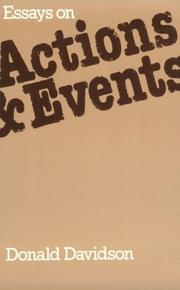
ISBN: 0198246374 9780198245292 0198245297 9780198246374 Publisher: Oxford : Clarendon press,
Abstract | Keywords | Export | Availability | Bookmark
 Loading...
Loading...Choose an application
- Reference Manager
- EndNote
- RefWorks (Direct export to RefWorks)
Philosophical anthropology --- Metaphysics --- Act (Philosophy) --- Events (Philosophy) --- Act (Philosophy). --- Events (Philosophy). --- Action (Philosophy) --- Philosophy --- Agent (Philosophy) --- 800 --- 800 Taalwetenschap. Taalkunde. Linguistiek --- Taalwetenschap. Taalkunde. Linguistiek
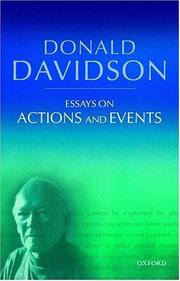
ISBN: 0199246270 0199246262 0191715190 9786611944162 1281944165 0191529826 9780191529825 9780199246274 9780191715198 9780199246267 9781281944160 6611944168 Year: 2001 Publisher: Oxford : Clarendon press,
Abstract | Keywords | Export | Availability | Bookmark
 Loading...
Loading...Choose an application
- Reference Manager
- EndNote
- RefWorks (Direct export to RefWorks)
Donald Davidson has prepared a new edition of his classic 1980 collection of Essays on Actions and Events, including two additional essays.
Act (Philosophy) --- Events (Philosophy) --- Psychology --- Action (Philosophie) --- Evénement (Philosophie) --- Psychologie --- Philosophy --- Philosophie --- Events (Philosophy). --- Action (Philosophy) --- Agent (Philosophy)
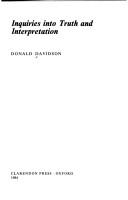
ISBN: 0198750463 019824617X 9780198246176 9780198750468 Year: 1984 Publisher: Oxford: Clarendon,
Abstract | Keywords | Export | Availability | Bookmark
 Loading...
Loading...Choose an application
- Reference Manager
- EndNote
- RefWorks (Direct export to RefWorks)
-800.1 --- Language and languages --- Philosophy. --- 800.1 --- 800.1 Taalfilosofie --- Taalfilosofie --- Philosophy --- Lexicology. Semantics --- Philosophy of language --- Theory of knowledge --- Langage et langues --- Philosophie --- Language and languages - Philosophy.
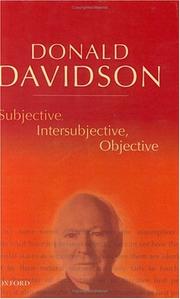
ISBN: 9780198237532 0198237529 9780198237525 0198237537 Year: 2001 Publisher: Oxford: Clarendon,
Abstract | Keywords | Export | Availability | Bookmark
 Loading...
Loading...Choose an application
- Reference Manager
- EndNote
- RefWorks (Direct export to RefWorks)
Essais parus dans divers revues et ouvrages collectifs de 1982 à 1998
Théorie de la connaissance. --- Subjectivité. --- Objectivité. --- Knowledge, Theory of. --- Brain. --- Other minds (Theory of knowledge) --- Subjectivity --- Philosophy of mind --- Théorie de la connaissance --- Altérité --- Subjectivité --- Philosophie de l'esprit --- Brain --- Knowledge, Theory of --- 800.1 --- 800.1 Taalfilosofie --- Taalfilosofie --- Minds of others (Theory of knowledge) --- Mind and body --- Epistemology --- Theory of knowledge --- Philosophy --- Psychology --- Cerebrum --- Mind --- Central nervous system --- Head --- Other minds (Theory of knowledge). --- Philosophical anthropology --- Philosophy of language --- Knowledge [Theory of ]
Book
Year: 1958 Publisher: Athens (Ga.): University of Georgia press,
Abstract | Keywords | Export | Availability | Bookmark
 Loading...
Loading...Choose an application
- Reference Manager
- EndNote
- RefWorks (Direct export to RefWorks)
Book
ISBN: 0816603723 081666207X 0816668523 Year: 1966 Publisher: University of Minnesota Press
Abstract | Keywords | Export | Availability | Bookmark
 Loading...
Loading...Choose an application
- Reference Manager
- EndNote
- RefWorks (Direct export to RefWorks)
Book
ISBN: 0824032012 Year: 1990 Publisher: New York (N.Y.): Garland
Abstract | Keywords | Export | Availability | Bookmark
 Loading...
Loading...Choose an application
- Reference Manager
- EndNote
- RefWorks (Direct export to RefWorks)
Idea (Philosophy) --- Methodology --- One (The One in philosophy) --- Pleasure --- Plato.
| Listing 1 - 10 of 96 | << page >> |
Sort by
|

 Search
Search Feedback
Feedback About UniCat
About UniCat  Help
Help News
News